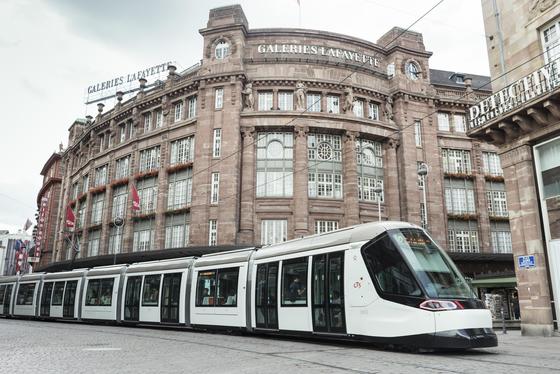
Parcel delivery by tram in Strasbourg, an experiment to improve the flow of traffic in the city centre
Parcel delivery by tram in Strasbourg, an experiment to improve the flow of traffic in the city centre
Press contact - France Great East
Arnaud Zeisser
Send an emailPress contact - Philippe Molitor
Philippe Molitor
Send an emailFrom 16 September to 26 October 2024, an experiment of parcel transport by tram will be carried out on Line B of Strasbourg’s public transport network. This initiative, led by La Poste, Alstom, Eurométropole de Strasbourg and the Strasbourg transport company CTS, aims to explore new parcel delivery solutions, optimising the available capacity of the existing transport infrastructure.
This project is the fruit of cooperation between 4 major players: La Poste, a logistics and parcel delivery operator; Alstom, a world leader in sustainable and intelligent mobility; Eurométropole de Strasbourg (EMS) as the transit authority and the Compagnie des Transports Strasbourgeois (CTS) as the network operator.
In practice, this means Colissimo parcels will be delivered via Line B trams. The route will run from Hœnheim Gare station to Broglie station, in the heart of Strasbourg city centre. At 9.00 am, a postman will accompany around a hundred parcels in the tram’s lead car. On arrival at Broglie, a second postman will load the parcels onto a cargo bike and deliver them to Strasbourg’s inner city. During the trial, a second route will be added in the early afternoon.
This experiment in tram parcel transport, carried out under real conditions, will enable the partners to check whether parcels can coexist with passengers, without impacting on passenger comfort or on operation of the tram network, and without altering the parcel delivery service. If this is the case, it will help to define new logistical solutions in which delivery links made by truck could in future be operated by tram.
The 4 partners share a desire to innovate by developing logistics solutions that respond to several current issues: reducing urban congestion, rethinking public space and improving urban air quality.
The experiment is in line with the objectives of the roadmap “for sustainable, low-carbon urban logistics” adopted by Eurométropole de Strasbourg in 2023. The local authority is aiming to reduce heavy goods vehicle and commercial vehicle traffic in favour of alternative modes such as cyclo-logistics, river freight and rail freight. It is also promoting innovation by hosting avant-garde experiments. For example, following on from the long-term river freight experiment, Eurométropole is continuing its efforts to promote short-distance rail freight.
While urban goods transport accounts for 20% of urban traffic and 30% of road use, it is responsible for 50% of diesel consumption. As a result, it is responsible “for 25% of greenhouse gas emissions and 35% to 45% of particle emissions”[1] .
In response, La Poste is working to develop sustainable urban logistics in the regions by co-constructing innovative solutions with local authorities and economic players. To this end, it has signed cooperation agreements with 18 cities in France, including Strasbourg. With them, it is developing new, less polluting urban logistics solutions. Here in Strasbourg, La Poste has already deployed 22 cargo bikes and 20 electric vehicles for parcel delivery.
As the instigator of this unique partnership, Alstom relies on digital innovation to make transport ever more sustainable, safe and efficient. Thanks to its expertise, Alstom is helping municipal authorities to achieve greater fluidity and capacity in their various transport services, by predicting variations in passenger and goods flows, adapting to them and responding to changes in real time.
[1] Fact-finding mission on sustainable urban logistics. Report by Senators HERZOG and FILLEUL, 24 May 2022
